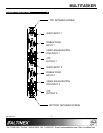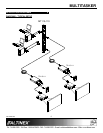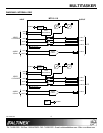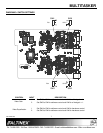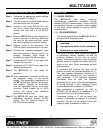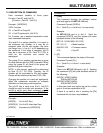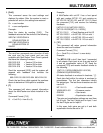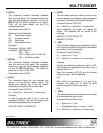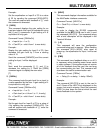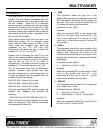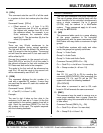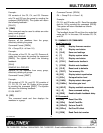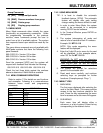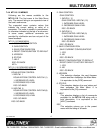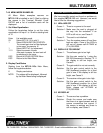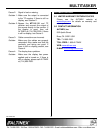
MULTITASKER
400-0433-003
12
Example:
Set the equalization on Input 2 of C3 to a value
of 32 by sending the command [EQ2=32C3].
The card will respond with feedback of “[ ]” once
the command is executed.
12. [GAIN]
This command displays the gain setting for an
input and selects that input for adjustment using
the [+] and [-] commands. A gain setting of 4 is
equivalent to unity gain.
Command Format: [GAINmCn]
m = Input # (m = 1 or 2)
Cn = Card ID (n = slot # from 1 to max slots)
Example:
Display the gain setting for Input 2 of C3, then
decrease the gain level by 3 from a starting
value of 10.
Send the command [GAIN2C3] and the current
setting for Input 1 will be displayed.
[10]
Next, send the commands [-], [-], and [-] to
decrease the setting by 3. Send the [GAIN]
command again to display the new value.
[7]
13. [GAIN=]
This command sets the gain level for an input to
a value specified by the user. A gain setting of 4
is equivalent to unity gain.
Command Format: [GAINm=xCn]
m = Input # (m = 1 or 2)
x = Gain level (m = # from 1 to 11, 4=unity)
Cn = Card ID (n = slot # from 1 to max slots)
Example:
Set the gain level for Input 2 of C3 to a value of
4 by sending the command [GAIN2=4C3]. The
card will respond with feedback of “[ ]” once the
command is executed.
14. [HELP]
This command displays information available for
the MultiTasker interface commands.
Command Format: [HELPCn]
Cn = Card ID (n = # from 1 to max slots)
Example:
In order to display the RS-232 commands
available for the MT115-110 card in slot 3, send
the command [HELPC3]. The commands along
with a brief description will be displayed in the
Terminal Window.
15. [...S]
This command will save the configuration
command being sent in memory. When sending
the command [EQ1=16C3S], after reset or
power-up, the equalization for Input 1 will be set
to 16.
16. [FBD]
This command turns feedback delay on or off. It
is necessary when installing some newer cards
in older systems. If the system does not receive
all of the feedback from the card, the card may
be communicating too fast. This command will
slow down the card's communication rate.
Command Format: [FBDm]
m = Delay (0= no delay, 1= delay 100mS)
Example:
The command [HELPC3] is sent to the card in
slot 3. Some of the HELP file is displayed on the
screen, but most is missing. Send the command
[FBD1] to slow down the rate at which the card
sends feedback to the system.



